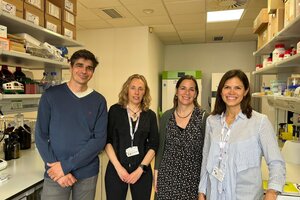The amino acid L-serine shows efficacy in treating patients with mutations in GRIN genes
A clinical trial conducted by the Institut de Recerca Sant Joan de Déu - SJD Barcelona Children's Hospital, the Institute of Neurosciences at the University of Barcelona (INc-UB), IDIBAPS and the University of Vic - Central University of Catalonia (UVic-UCC), led by Dr Àngels García-Cazorla (IRSJD), has demonstrated the potential of the amino acid L-serine, administered as an oral supplement, to improve the function of glutamate receptors in patients with GRINpathies. The results have been published in the scientific journal Brain.
GRINpathies are disorders resulting from mutations in the GRIN genes, representing an ultra-rare neuropediatric disease for which there is currently no curative treatment available. This genetic disease disrupts the normal development of the brain and causes serious issues such as intellectual disability, motor activity alterations, social behaviour disorders, digestive problems and epilepsy.
"Mutations in the GRIN genes affect the subunits of NMDA-type glutamate receptors, a key element in synaptic activity and neuronal function. For this reason, children carrying mutations in the GRIN genes present a series of symptoms related to abnormal nervous system function. Currently, we are working on classifying mutations in the GRIN genes in order to be able to design and provide precision therapies based on the mutation type, thereby compensating for the increase or decrease in NMDA receptor function", states Mireia Olivella, researcher at UVic-UCC and an expert in computational structural biology.
"In this trial, we wanted to assess the ability of the amino acid L-serine to enhance NMDA receptors in those patients who have been genetically and functionally diagnosed as carriers of mutations causing NMDA receptor hypofunction", states Xavier Altafaj, GRINpathies expert researcher at INc-UB and a researcher with the Neurophysiology Research Group at IDIBAPS.
A phase 2A clinical trial in 24 patients with GRINpathies
L-serine is the precursor of D-serine, a co-agonist of NMDA receptors which, when bound to its receptor, can trigger channel activation, allowing calcium entry and neuronal communication. L-serine is a nutraceutical commonly used in paediatrics. In previous studies the research team previously discovered that its supplementation in patients with GRINpathies carrying mutations affecting the GRIN2B gene provides benefits to their motor and cognitive performance.
"Now, with this first-phase 2A trial, we wanted to verify the safety and efficacy of L-serine in 24 patients with GRINpathies. Firstly, we wanted to assess its safety and tolerance; we also sought to examine the potential benefits for cognitive function, motor function, and seizure reduction," indicates Natalia Julià-Palacios, a neuropaediatrician at the Metabolic Diseases Unit, IRSJD researcher and first author of the article published in the journal Brain.
The findings from the initial trial reveal that treatment with L-serine improves neurological symptoms such as hyperactivity or sustained attention, as well as leading to a reduction in epileptic seizures. It may also be observed that the treatment response varies according to the severity of the child's condition. For instance, it proved to be more effective in those with milder clinical manifestations. The findings from this first clinical trial for GRINpathies worldwide have been published in the scientific journal Brain and they constitute the starting point for the development of new therapeutic strategies for this disease.
"We believe that these results pave the way for further exploration into new therapeutic modulation strategies for neuronal metabolism, with the aim of improving quality of life for patients with rare diseases", concludes Dr Àngels García-Cazorla, head of the Metabolic Diseases Unit at SJD Barcelona Children's Hospital, researcher at IRSJD and coordinator of the Paediatric Neurometabolism Group: neuronal communication mechanisms and personalised therapies at IRSJD.
The next steps will involve determining the optimal dose of L-serine and assessing its long-term effects.
This clinical study has been made possible thanks to cooperation between clinical, experimental and computational research teams and patients from hospitals throughout Spain, demonstrating their commitment to finding new treatments for rare diseases. The study is part of the UNICAS strategy promoted by SJD Barcelona Children's Hospital to provide a comprehensive response to the medical and social challenges posed by rare diseases.
Reference article
Juliá-Palacios N, Olivella M, Sigatullina Bondarenko M, Ibáñez-Micó S, Muñoz-Cabello B, Alonso-Luengo O, Soto-Insuga V, García-Navas D, Cuesta-Herraiz L, Andreo-Lillo P, Aguilera-Albesa S, Hedrera-Fernández A, González Alguacil E, Sánchez-Carpintero R, Martín Del Valle F, Jiménez González E, Cean Cabrera L, Medina-Rivera I, Perez-Ordoñez M, Colomé R, Lopez L, Engracia Cazorla M, Fornaguera M, Ormazabal A, Alonso-Colmenero I, Illescas KS, Balsells-Mejía S, Mari-Vico R, Duffo Viñas M, Cappuccio G, Terrone G, Romano R, Manti F, Mastrangelo M, Alfonsi C, de Siqueira Barros B, Nizon M, Gjerulfsen CE, L Muro V, Karall D, Zeiner F, Masnada S, Peterlongo I, Oyarzábal A, Santos-Gómez A, Altafaj X, García-Cazorla Á. L-serine treatment in patients with GRIN-related encephalopathy: A phase 2A, non-randomized study. Brain. 2024 Feb 21:awae041. doi: 10.1093/brain/awae041. Epub ahead of print. PMID: 38380699.

These results open the doors for us to continue exploring new therapeutic strategies for modulating neuronal metabolism, with the aim of improving the quality of life for patients with rare diseases.
